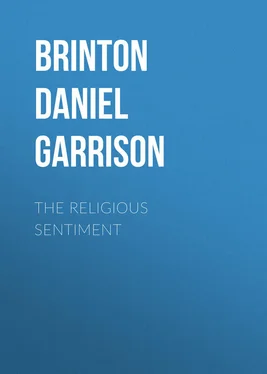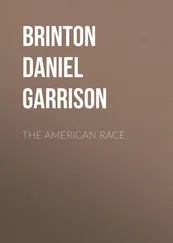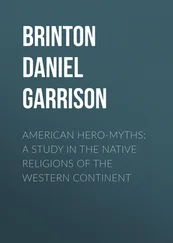Daniel Brinton - The Religious Sentiment
Здесь есть возможность читать онлайн «Daniel Brinton - The Religious Sentiment» — ознакомительный отрывок электронной книги совершенно бесплатно, а после прочтения отрывка купить полную версию. В некоторых случаях можно слушать аудио, скачать через торрент в формате fb2 и присутствует краткое содержание. ISBN: , Жанр: foreign_antique, foreign_prose, на английском языке. Описание произведения, (предисловие) а так же отзывы посетителей доступны на портале библиотеки ЛибКат.
- Название:The Religious Sentiment
- Автор:
- Жанр:
- Год:неизвестен
- ISBN:http://www.gutenberg.org/ebooks/30061
- Рейтинг книги:3 / 5. Голосов: 1
-
Избранное:Добавить в избранное
- Отзывы:
-
Ваша оценка:
- 60
- 1
- 2
- 3
- 4
- 5
The Religious Sentiment: краткое содержание, описание и аннотация
Предлагаем к чтению аннотацию, описание, краткое содержание или предисловие (зависит от того, что написал сам автор книги «The Religious Sentiment»). Если вы не нашли необходимую информацию о книге — напишите в комментариях, мы постараемся отыскать её.
The Religious Sentiment — читать онлайн ознакомительный отрывок
Ниже представлен текст книги, разбитый по страницам. Система сохранения места последней прочитанной страницы, позволяет с удобством читать онлайн бесплатно книгу «The Religious Sentiment», без необходимости каждый раз заново искать на чём Вы остановились. Поставьте закладку, и сможете в любой момент перейти на страницу, на которой закончили чтение.
Интервал:
Закладка:
The problem is, to find out why the primitive man figured to himself any gods at all; what necessity of his nature or his condition led him so universally to assume their existence, and seek their aid or their mercy? The conditions of the solution are, that it hold good everywhere and at all times; that it enable us to trace in every creed and cult the same sentiments which first impelled man to seek a god and adore him. Why is it that now and in remotest history, here and in the uttermost regions, there is and always has been this that we call religion ? There must be some common reason, some universal peculiarity in man’s mental formation which prompts, which forces him, him alone of animals, and him without exception, to this discourse and observance of religion. What this is, it is my present purpose to try to find out.
In speaking of the development of mind through organism, it was seen that the emotions precede the reason in point of time. This is daily confirmed by observation. The child is vastly more emotional than the man, the savage than his civilized neighbor. Castren, the Russian traveller, describes the Tartars and Lapps as a most nervous folk. When one shocks them with a sudden noise, they almost fall into convulsions. Among the North American Indians, falsely called a phlegmatic race, nervous diseases are epidemic to an almost unparalleled extent. Intense thought, on the other hand, as I have before said, tends to lessen and annul the emotions. Intellectual self-consciousness is adverse to them.
But religion, we are everywhere told, is largely a matter of the emotions. The pulpit constantly resounds with appeals to the feelings, and not unfrequently with warnings against the intellect. “I acknowledge myself,” says the pious non-juror, William Law, “a declared enemy to the use of reason in religion;” and he often repeats his condemnation of “the labor-learned professors of far-fetched book-riches.” 21 21 Address to the Clergy , pp. 42, 43, 67, 106, etc.
As the eye is the organ of sight, says one whose thoughts on such matters equal in depth those of Pascal, so the heart is the organ of religion. 22 22 E. von Hardenberg [Novalis], Werke , s. 364.
In popular physiology, the heart is the seat of the emotions as the brain is that of intellect. It is appropriate, therefore, that we commence our analysis of the religious sentiment with the emotions which form such a prominent part of it.
Now, whether we take the experience of an individual or the history of a tribe, whether we have recourse to the opinions of religious teachers or irreligious philosophers, we find them nigh unanimous that the emotion which is the prime motor of religious thought is fear . I need not depend upon the well-known line of Petronius Arbiter
Primus in orbe deos fecit timor;
, for there is plenty of less heterodox authority. The worthy Bishop Hall says, “Seldom doth God seize upon the heart without a vehement concussion going before. There must be some blustering and flashes of the law. We cannot be too awful in our fear.” 23 23 Treatises Devotional and Practical , p. 188. London, 1836.
Bunyan, in his beautiful allegory of the religious life, lets Christian exclaim: “Had even Obstinate himself felt what I have felt of the terrors of the yet unseen, he would not thus lightly have given us the back .” The very word for God in the Semitic tongues means “fear;” 24 24 In Aramaic dachla means either a god or fear. The Arabic Allah and the Hebrew Eloah are by some traced to a common root, signifying to tremble, to show fear, though the more usual derivation is from one meaning to be strong.
Jacob swore to Laban, “by Him whom Isaac feared;” and Moses warned his people that “God is come, that his fear may be before your faces.” To venerate is from a Sanscrit root ( sêv ), to be afraid of.
But it is needless to amass more evidence on this point. Few will question that fear is the most prominent emotion at the awakening of the religious sentiments. Let us rather proceed to inquire more minutely what fear is.
I remarked in the previous chapter that “the emotions fall naturally into a dual classification, in which the one involves pleasurable or elevating, the other painful or depressing conditions.” Fear comes of course under the latter category, as it is essentially a painful and depressing state of mind. But it corresponds with and implies the presence of Hope, for he who has nothing to hope has nothing to fear. 25 25 “Wen die Hoffnung, den hat auch die Furcht verlassen.” Arthur Schopenhauer, Parerga und Paralipomena . Bd. ii. s. 474.
“There is no hope without fear, as there is no fear without hope,” says Spinoza. “For he who is in fear has some doubt whether what he fears will take place, and consequently hopes that it will not.”
We can go a step further, and say that in the mental process the hope must necessarily precede the fear. In the immediate moment of losing a pleasurable sensation we hope and seek for its repetition. The mind, untutored by experience, confidently looks for its return. The hope only becomes dashed by fear when experience has been associated with disappointment. Hence we must first look to enjoy a good before we can be troubled by a fear that we shall not enjoy it; we must first lay a plan before we can fear its failure. In modern Christianity hope, hope of immortal happiness, is more conspicuous than fear; but that hope is also based on the picture of a pleasant life made up from experience.
Both hope and fear, therefore, have been correctly called secondary or derived emotions, as they presuppose experience and belief, experience of a pleasure akin to that which we hope, belief that we can attain such a pleasure. “We do not hope first and enjoy afterwards, but we enjoy first and hope afterwards.” 26 26 Alexander Bain, On the Study of Character , p. 128. See also his remarks in his work, The Emotions and the Will , p. 84, and in his notes to James Mill’s Analysis of the Mind , vol. i., pp. 124-125.
Having enjoyed, we seek to do so again. A desire, in other words, must precede either Hope or Fear. They are twin sisters, born of a Wish.
Thus my analysis traces the real source of the religious sentiment, so far as the emotions are concerned, to a Wish; and having arrived there, I find myself anticipated by the words of one of the most reflective minds of this century: “All religion rests on a mental want; we hope, we fear, because we wish.” 27 27 Wilhelm von Humboldt’s Gesammelte Werke , Bd. vii., s. 62.
And long before this conclusion was reached by philosophers, it had been expressed in unconscious religious thought in myths, in the Valkyria, the Wish-maidens, for instance, who carried the decrees of Odin to earth.
This is no mean origin, for a wish, a desire, conscious or unconscious, in sensation only or in emotion as well, is the fundamental postulate of every sort of development, of improvement, of any possible future, of life of any kind, mental or physical. In its broadest meaning, science and history endorse the exclamation of the unhappy Obermann: “ La perte vraiment irréparable est celle des désirs. ” 28 28 De Senancourt, Obermann , Lettre xli.
The sense of unrest, the ceaseless longing for something else, which is the general source of all desires and wishes, is also the source of all endeavor and of all progress. Physiologically, it is the effort of our organization to adapt itself to the ever varying conditions which surround it; intellectually, it is the struggle to arrive at truth; in both, it is the effort to attain a fuller life.
As stimuli to action, therefore, the commonest and strongest of all emotions are Fear and Hope. They are the emotional correlates of pleasure and pain, which rule the life of sensation. Their closer consideration may well detain us awhile.
Читать дальшеИнтервал:
Закладка:
Похожие книги на «The Religious Sentiment»
Представляем Вашему вниманию похожие книги на «The Religious Sentiment» списком для выбора. Мы отобрали схожую по названию и смыслу литературу в надежде предоставить читателям больше вариантов отыскать новые, интересные, ещё непрочитанные произведения.
Обсуждение, отзывы о книге «The Religious Sentiment» и просто собственные мнения читателей. Оставьте ваши комментарии, напишите, что Вы думаете о произведении, его смысле или главных героях. Укажите что конкретно понравилось, а что нет, и почему Вы так считаете.












